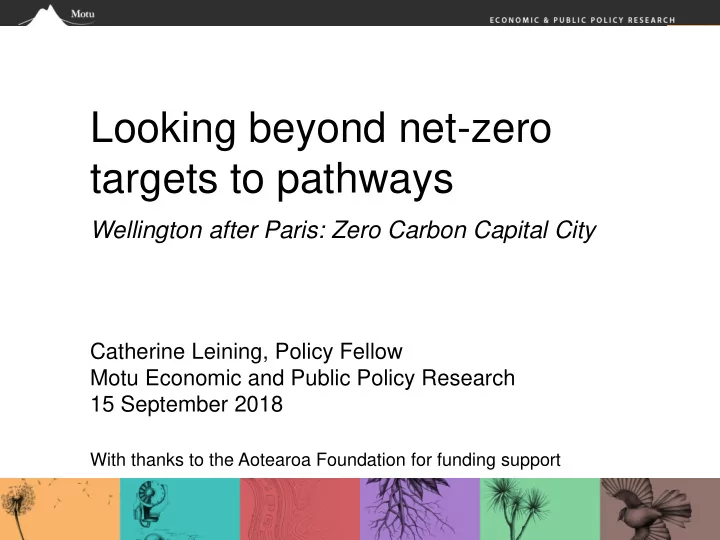

Looking beyond net-zero targets to pathways Wellington after Paris: Zero Carbon Capital City Catherine Leining, Policy Fellow Motu Economic and Public Policy Research 15 September 2018 With thanks to the Aotearoa Foundation for funding support
Topics for today New Zealand’s mitigation challenge Possible pathways for low-emission transformation Reflections for Wellington
Bending the global curve Source: Carbon Tracker Initiative et al. (2017). 2020: The Climate Turning Point . Mission 2020.
NZ’s GHG emission profile Over 1990 – 2016: Gross emissions (excl forestry) increased 19.6% Net emissions (incl forestry) increased 54.2% Source: MfE (2018). New Zealand’s Greenhouse Gas Inventory 1990-2016. Wellington: Ministry for the Environment.
NZ emissions with current measures: 1990-2030 Source: MfE (2017). New Zealand’s Third Biennial Report under the UNFCCC . Wellington: Ministry for the Environment.
NZ avg household emissions: 2012 Source: Allan and Kerr (2017). Who’s Going Green? Motu Economic and Public Policy Research.
Wellington City’s emissions: 2001 -2015 Total: 1.1 million tonnes CO 2 e 5.32 tonnes CO 2 e/person Transportation Stationary energy
Wellington City’s targets Progress so far: 1.9% reduction in citywide net emissions from 2000/01 to 2014/15
Climate policy framework Past objective: Least-cost compliance with modest international responsibility targets = Incremental change New context: Joining global decarbonisation = Transformational change
Driving a zero-net-emissions future Zero-net-emission electricity – utility and distributed Transport powered Industrial heat powered (primarily) by electricity (primarily) by electricity Policies, regulations and Enhanced grid and or renewable fuels or renewable fuels market mechanisms energy storage Product substitution and climate-smart behaviour Land-use planning and Enhanced transport urban design infrastructure Increased non- Ultra-GHG efficient ruminant ruminant, low-N 2 O food production production Forest management for sequestration and biofuels Offsetting of residual emissions by CCS or other means
Range of possible futures Transport Transport supply : Stationary vehicle technology, energy Renewable electricity : networks, infrastructure utility, distributed Transport demand : Storage : mode shift, urban planning, hydro lakes, batteries, Industrial heat : culture change, technology hydrogen, disruptor electric, renewable, change, disruptor hydrogen, disruptor Energy efficiency, conservation Transport energy : Carbon capture electricity, biofuel, and storage hydrogen, disruptor Food production : ultra-GHG-efficient livestock, zero-CH 4 , low-N 2 O nutrition Reduced food synthetic meat/milk waste Consumer demand for low-emission food Agriculture
Pivot points – nodes Transport Stationary Sustained change energy Major gas field Export carriers to oil prices ↕ discovery for renewable Major transport EV costs electricity investment Aluminium Biofuel technology Smart grid technology International smelter operation shipping supply/ Social norms for Battery Commitment to demand/cost vehicle ownership technology end energy poverty Rail decommissioning Commercially viable CCS Lithium shortage Methane vaccine Consumer tastes Tech change/water Biomass demand ↕ shortages affect milk powder demand Fish stock collapse Pests or disease Synthetic milk/meat Agriculture
Who will make change happen? Central and local government Civil society Academic & research Businesses institutions
Two extreme scenarios for change Technology Social breakthrough breakthrough
Productivity Commission: Yes we can! 3 modelling scenarios show it’s possible to get to low net emissions (25 Mt CO 2 e) and zero net emissions by 2050 Not predictions or recommendations – just possibilities All modelling is based on assumptions and subject to uncertainties
3 modelling scenarios Policy Driven Slow technology change Decarbonisation Strong policies and high carbon prices Disruptive Rapid technology change Decarbonisation Shift to new economic activities Disruption to existing industries/assets Stabilising Rapid technology change Decarbonisation Continuation of existing economic activities
2050 modelling assumptions/outputs Factor Policy Driven Disruptive Stabilising Electricity >45% 58-63% >45% demand increase increase increase Light vehicle 65% EV 80% EV 40% EV fleet Heavy vehicle 25% EV 50% EV 10% EV fleet Public/active 50% increase 75% increase 25% increase transport trips above 2015 above 2015 above 2015 Car share 20% increase 30% increase 10% increase Carbon price 2030 $55-80 $30-55 $30-55 2050 $142-200 $75-157 $152-250
Change drivers Innovation Acc Accele eleration ration Le Leader adership ship
Examples of collective approaches • Z Energy – Programme to improve commercial customers’ driving efficiency as part of its biofuel strategy (New Zealand) • Honda and Solar City – Partnership to fund residential solar PV installations by Honda customers (USA) • Mosaic – Crowd financing for community solar projects (USA) • Interfaith Power and Light – Aggregation of purchasing power for energy efficiency and renewable energy upgrades to churches nationwide (USA) • University of Leeds and major UK industries – Research fellowships to solve environmental problems
Final reflections • Wellington City will not reach net zero acting alone • There is no single right pathway • We need both individual and system change • Public education and engagement are key • We need to look out for each other • It’s okay to make mistakes – if we learn well • Mobilising networks will accelerate change • Create a bold future vision – and live into it!
Where do we go next? “In times of change, learners inherit the earth, while the learned find themselves beautifully equipped to deal with a world that no longer exists.” Eric Hoffer Social writer and philosopher
For more information
For more information
For more information Read our paper on outcomes from the LEF Dialogue, and idea bank www.motu.org.nz Try our Household Climate Action Tool http://insights.nzherald.co.nz/article/clim ate-action-tool Subscribe to our blog “New Zealand’s Low- Emission Future” http://low-emission- future.blogspot.co.nz/ Send me an email: Catherine.Leining@motu.org.nz
Recommend
More recommend